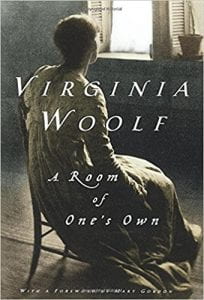
Virginia Woolf spoke of needing a “room of one’s own” in which to write. Her remarks were partly in response to a culture where intellectual work was not seen as women’s work, where women were given neither the physical nor abstract spaces in which to pursue their own thoughts. Thankfully, today these issues are less gendered (though not completely so!), but the fact remains that writing benefits from spaces set apart from daily chores and distractions. Now the room of one’s own is threatened not by domestic duties so much as a constant stream of emails and social media. In academic life, the room is further constrained by teaching, administrative tasks, classwork, and — as for many trainees — part-time jobs unrelated to their larger writing projects.
That’s why I was so thrilled to participate in a week-long dissertation writing retreat last week, sponsored by the University of Washington Odegaard Library Writing and Research Center (OWRC). Throughout the week, periods of dedicated writing were interspersed with peer mentor/tutor sessions and workshops on topics like mindfulness/meditation and cognitive strategies for success. In addition to making solid progress on a difficult chapter in my dissertation, I cultivated some practices that can help sustain me through my summer writing and beyond.
What is writing?
A rather obvious but important question to consider is what writing actually is. The obvious image is sitting down to your computer (or pen and paper) and drafting beautiful prose that you then pass along to your reader. As one presenter at the retreat described, this is actually “writing 2.” If we hold ourselves to writing 2 every time we sit down to write, the intimidation and perfectionism often keeps us from writing anything at all. Instead, cultivating “writing 1” is a way to break through those barriers and build ourselves up to writing 2. Writing 1 may be a free write on the topic, or reflective writing where you work out your doubts and fears about the writing task ahead. Writing 1 can also involve organizing notes and references and making interpretive comments as you read through another article or source. Importantly, writing 1 may be something you never share with anyone else, which can relieve some of the pressure to deliver a polished or even semi-articulate product to a colleague or mentor.
What supports writing?
Whether it’s writing 1 or writing 2, it’s been my experience that many things must align for me to actually be able to sit down and write. There is a constellation of physical, emotional, and intellectual factors at play. A good chair, nice lighting, tea or coffee, snacks on hand, comfortable clothes — in the Maslow’s hierarchy of needs for writing, these are at the base. The time of day and nature of your surroundings are also important components. Many retreat attendees were surprised to find that the morning writing sessions were their most productive, despite not being a “morning person.” I can relate. Part of that for me is that in the morning my mind is at it’s most tabula rasa, in terms of not yet being crowded with a bazillion other things going on in the day whether those are related to my staff scientist job (for a weekday) or a variety of domestic and social activities (on a weekend).
The emotional component is another biggie. It was extremely therapeutic to meet other dissertators at a similar stage and to share and empathize about the challenges of our respective projects. One workshop presenter described a dissertation as a large research task with “all of the responsibility and none of the authority.” That lack of authority is also what can contribute to crippling self-doubt and paralysis that our ideas are not good, our peers are far ahead of us, and our committees lack confidence and/or interest in our work.
Strategies for self-care are essential to this process, and I was delighted to see the emphasis on this throughout the retreat. We had morning check-ins and a final reflection at the end where we shared successes and reviewed progress towards our stated goals. Sometimes self-care means stepping away from the work completely and pursing a longtime hobby or perhaps trying your hand at something completely new. Other times self-care is cultivating compassion for yourself as you do the work: meeting your inner critic, seeing if they have anything useful to contribute and, if not, kindly showing them the door.
On a very practical front, I’ve found it extremely useful to do timed writing sessions (the Pomodoro technique) with other academic writers in large Slack channel. With the Slack Pomodoro plug-in, it’s easy to time sessions and, most importantly for me, to log distractions in a way that puts them out of sight until the timed session is up. I encourage others to check these resources out if they are looking for community of support and accountability in the midst of what can otherwise be a rather solitary experience.
Special thanks to the OWRC for the opportunity – oh yes, and all the snacks and catering!